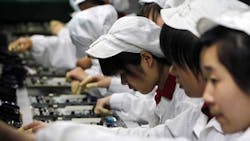China Manufacturing Contracts for 11th Consecutive Month, Says HSBC
China's manufacturing activity shrank for an 11th straight month in September, HSBC said Saturday, adding to pressure on Beijing to provide fresh stimulus to boost the world's second-largest economy.
The final reading of the purchasing mangers' index (PMI) released by the British banking giant hit 47.9 this month, a mild improvement from a final reading of 47.6 in August, HSBC said in a statement.
The index is closely watched as it gauges nationwide manufacturing activity, a key sector of the Chinese economy. A reading below 50 indicates a contraction in manufacturing, while a reading above 50 indicates expansion.
China's official PMI figure for August released earlier this month hit a nine-month low of 49.2.
Final Reading an Improvement Over Preliminary
The final HSBC reading was slightly above the preliminary PMI of 47.8, announced on Sept. 20, and may ease concerns over China's sharp slowdown.
The latest figure marked nearly a year of continuous contraction since November, underscoring broader economic weakness and shrinking demand in key overseas markets.
New export orders fell at the fastest rate in 42 months, HSBC said, indicating that economic weakness in major export markets such as the United States and Europe were continuing to weigh on the Chinese economy.
Chinese Manufacturing Probably Hit Low Point
Qu Hongbin, HSBC's Hong Kong-based chief economist for China, said that manufacturing was probably hitting its low point but that Beijing still needed to introduce further stimulus to help the economy.
"Chinese manufacturing growth is likely to be bottoming out," he said in a statement.
More Stimulus Measures Needed
"However, the sharper contraction of new export orders and the lingering pressures on job markets mean that Beijing should step up easing to support growth and employment," he added.
"Fiscal measures should play a more important role in the coming months".
Authorities this year have tried to boost the economy with interest rate cuts and by lowering the amount of cash banks must keep on hand in a bid to spur the kind of lending that could stimulate stronger growth.
There are expectations that the government will take the upcoming week-long public holiday as an opportunity to introduce a new round of stimulus.
China's economic growth slowed to 7.6% in the three months through June, the sixth straight quarter of weakening expansion and the worst result since the height of the global financial crisis.
Weak economic data in the current third quarter have raised fears China's growth may have slowed for a seventh straight quarter when gross domestic product figures are released next month.
Problems in the broader global economy, including Europe's prolonged debt crisis and a sluggish recovery in the United States -- both major trading partners for China -- have been a drag on growth.
Premier Wen Jiabao said this month that China is still likely to achieve its annual economic growth target of 7.5%. Even so, that would mark a significant slowdown from 9.3% growth in 2011 and 10.4% in 2010.
The commerce ministry said this month that China faced "enormous difficulties" in meeting its target to maintain 10% growth in trade this year, citing weak overseas demand as the world economy remains under pressure.
Dow Jones Newswires contributed to this report.
Copyright Agence France-Presse, 2012
About the Author
Agence France-Presse
Copyright Agence France-Presse, 2002-2025. AFP text, photos, graphics and logos shall not be reproduced, published, broadcast, rewritten for broadcast or publication or redistributed directly or indirectly in any medium. AFP shall not be held liable for any delays, inaccuracies, errors or omissions in any AFP content, or for any actions taken in consequence.
